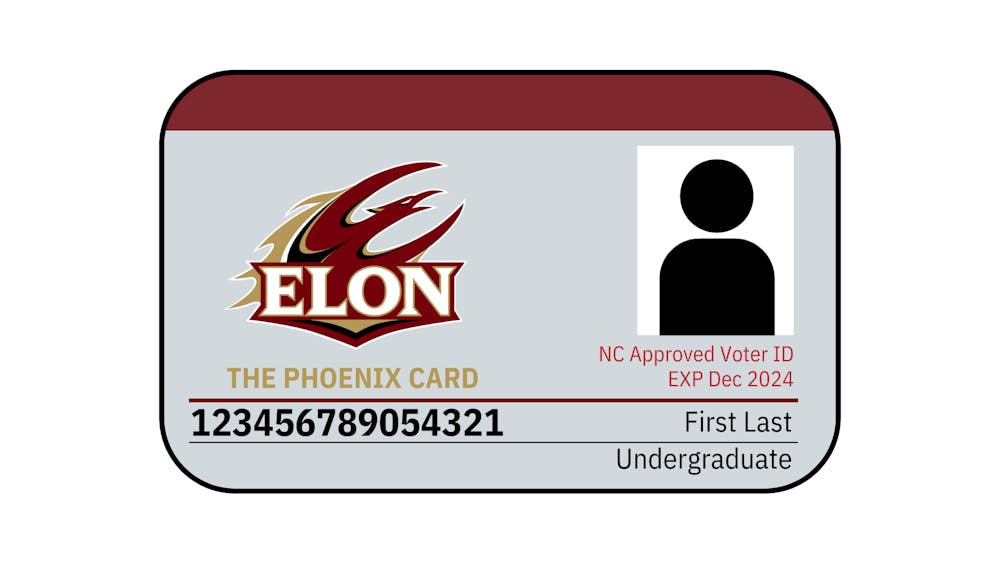Elon University students voted in on-campus elections for freshman senators on Sept. 12. As local elections approach, alternatives to voter ID are being introduced to help students vote in off-campus local municipal elections through the new Elon Phoenix Voting card.
North Carolina requires voters to present an ID, drivers’ license or university card starting in 2023. The new Elon Phoenix Voting cards are a substitute for identification and look like the typical Phoenix ID, but are labeled with a valid “North Carolina voter” inscription, much like a U.S. real ID.
Phoenix Card Services, located on the second floor of McCoy Commons, said it will print the cards in the office with no fee. The cards also can be used as typical Phoenix cards until their expiration in December 2024.
Director of Phoenix Card Services Janet Rauhe said Phoenix Voting cards allow students to easily vote in-state if they choose to cast their ballots in North Carolina.
“If you’re interested in what’s going on in our community, our state and the nation, yes absolutely, that’s what it’s for,” Rauhe said. “I think we’re gonna see more and more of it.”
Elon Student Government Association class of 2027 President Michael Swartz said he hopes students see the significance of student voting as elections progress throughout the school year.
Swartz said he believes the Phoenix Voting Cards are a great initiative that allow students to reach polling places easier.
“I don’t think it’s just putting more stuff out there to tell people to vote,” Schwarts said. “If they know it’s happening, they will care more. Caring leads to more caring, more people will encourage others to vote.”
Sophomore Elon Votes! ambassador Emily Leach said the cards will increase voter turnout.
“I think it’ll help students be more civically engaged,” Leach said. “Having a card makes it much more convenient for students.”
While SGA does not require any form of valid ID to vote, these on-campus elections are a good way to allow students the opportunity to vote in student elections before participating in official political polls.
During SGA freshman class elections, students were sent a QR code that allowed them to cast their votes for the class of 2027 elections.
According to SGA voting records, there was an uptick of votes for this year with the class of 2026 having 179 voters last year, as compared to class of 2027’s 464 voters — a 159% increase.
This reflects a larger trend in voter turnout in the state. According to the North Carolina Board of Elections, in non-presidential general election years, North Carolina voter turnout has increased from 43.57% in 2010 to 51.14% in 2022.
SGA class of 2027 Sen. Oliver Keicher said freshmen in this year’s election allowed student political associations to better understand what students look for in their student body representatives.
“Voter turnout for the freshman class was double what it was last year, however, we are still lower than our 100% — which is an ideal goal — but we wish to see more freshman vote every year,” Keicher said.
International freshman Arlan Visser said she voted in the SGA election. As a dual citizen of Canada and Namibia with a US green card, Visser said voting in any election she can is an opportunity that allows her voice to be heard.
She said sees SGA as a significant part of campus life.
“I think the more people vote, the more voice you get from the students,” Visser said. “I guess the more you have a student opinion and impact on an opinion on what works and doesn’t work. It’s definitely something that shouldn’t go away.”
Freshman Addy Smith said there is not enough information presented for students to understand where their votes go.
“I think it’s all about advertising and understanding how our vote will impact the school as a whole,” freshman Addy Smith said. “If I don’t know where my vote’s going or what it’s doing, I’m less likely to cast one.”
Local municipal elections in Burlington and Alamance County will be held Oct. 10 and Nov. 7, respectively.


